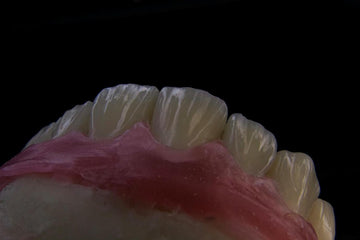Mouth Breathing: Causes, Symptoms, Dangers & Treatment

Mouth breathing may be seen as perfectly normal because everyone does it from time to time, right?
Well, while it does not hurt you to breathe through your mouth occasionally, it can become a problem when you do it all the time, especially while you’re sleeping.
To highlight the dangers — as well as the causes and treatment options available- our dental expert at Enlighten, Dr Sanjay Patel, shares everything you need to know about mouth breathing to improve your health.
What is mouth breathing?
Some people only breathe through their mouths and not their noses — this is known as mouth breathing.
Mouth breathing when you’re awake is fine. Think about when you’re exercising — sometimes, you need to breathe through your mouth to get air into your lungs and muscles faster.
However, problems can occur when you do it all the time, especially during sleep.
What are the dangers of mouth breathing?
Firstly, mouth breathing dries out your mouth. When your mouth is dry, saliva can’t accumulate. Without saliva — the body's natural protection for your teeth, gums, and mouth — you run the risk of increased infections and oral issues.
Excessive mouth breathing can lead to:
· Bad breath
· Throat and ear infections
· Periodontal diseases, like gingivitis, periodontitis and tooth cavities
More seriously, mouth breathing can cause sleep apnoea, which can lower oxygen levels and sleep quality, leading to additional symptoms like brain fog, fatigue, low energy levels and reduced concentration.
Sleep apnoea is also linked to heart disease, stroke and diabetes, so it isn’t a condition to be taken lightly. If you suspect sleep apnoea is the cause of your mouth breathing, you should speak to your GP or doctor.
Signs you’re breathing through your mouth when you sleep
You may not be aware of your mouth breathing, especially if you’re asleep or you don’t have a partner/someone living with you to tell you.
Also, the signs can be subtle and difficult to notice. Even if you do notice them, you might not have considered mouth-breathing issues before.
The signs you’re breathing through your mouth when you sleep can include:
· Dry mouth
· Bad breath (halitosis)
· Snoring
· Hoarseness
· Waking up feeling tired and irritable — possibly from things like sleep apnoea impacting sleep quality
· Chronic fatigue
· Brain fog
· Dark circles under the eyes
Causes of mouth breathing
Mouth breathing is typically caused by some form of obstruction in the respiratory system — whether it be physical illness or underlying disease.
The main causes of mouth breathing — particularly at night — typically include:
1. Nasal congestion – Allergies, colds, or sinus infections can block nasal passages, causing you to breathe through your mouth to take in the air you need.
2. Deviated septum – A structural deformity in the nose that restricts airflow. Sometimes, the genetic makeup of your nasal passage can make it difficult to breathe.
3. Enlarged tonsils or adenoids – Large tonsils can restrict airflow in the air canal, causing people to breathe through their mouths involuntarily.
4. Sleep apnoea – A condition that causes breathing disruptions, often linked to mouth breathing. It can cause a plethora of additional problems, so it should be looked at by a GP or respiratory specialist if identified.
5. Nasal polyps – Growths in the nasal passages that limit airflow and cause people to breathe through their mouth instead.
6. Chronic allergies – Inflammation and swelling make nasal breathing difficult.
7. Poor tongue posture – A low-resting tongue position can encourage mouth breathing.
8. Habitual mouth breathing – Conditions cause some people to continue to mouth breathe long after the condition has resolved itself. This can change with time.
9. Jaw or facial structure – Certain facial structures and genetic features can make nasal breathing more difficult.
10. Asthma – Difficulty breathing can lead to reliance on mouth breathing.
How is mouth breathing treated?
Mouth breathing can be tricky to identify. It’s caused by an underlying health condition that needs to be treated independently to cure the problem.
However, there are lots of things you can do to treat mouth breathing in the comfort of your own home, including the following:
1. Act fast on allergies and colds – At the first sign of symptoms, use saline sprays, decongestants, or allergy meds to keep your nose clear.
2. Elevate while you sleep – Sleeping on your back with your head slightly raised can help open your airways and encourage nose breathing.
3. Keep allergies at bay – Regularly clean your home to reduce dust, pet dander, and other triggers.
4. Upgrade your air quality – Install filters in your heating and cooling systems to trap allergens and keep your air fresh.
5. Train yourself to breathe through your nose – Make a conscious effort to breathe through your nose during the day to build the habit naturally.
FAQs
1. What are the advantages of breathing through your nose?
Breathing through your nose offers several benefits that go beyond simply taking in air.
For one, the nose acts as a natural filter, trapping dust, allergens, and harmful particles before they can enter your respiratory system.
Nasal breathing also promotes better sleep by reducing the chances of snoring and sleep apnoea, leading to improved sleep quality, overall health, and the prevention of complications.
Breathing through your nose also helps prevent a dry mouth, keeping your mouth rich with bacteria-combatting saliva.
2. What are the symptoms of mouth breathing in children?
Many of the symptoms of mouth breathing commonly found in adults — like tiredness, irritability, dry mouth and a decline in cognitive sharpness — are also found in children.
Symptoms like these can also be commonplace:
· Sleep disturbances
· Difficulty concentrating
· Poor academic performance
· Stunted growth
3. How can I stop my child's mouth breathing?
Your child's mouth breathing can be a worrying sign for any parent. If the problem is causing lots of the symptoms above, consult your doctor for advice and treatment.
However, there is something you can do in the meantime, like:
· Addressing nasal congestion: If allergies, colds, or sinus issues are causing mouth breathing, treat the underlying problem with saline sprays, allergy medications, or a humidifier.
· Encouraging nasal breathing — Remind your child to breathe through their nose during the day, especially when they’re relaxed or not focusing.
· Εlevating their head at night — Sleep with their head slightly raised to help open their airways and promote nose breathing.
· Check for tonsil/adenoid issues — If the problem persists, consult a doctor to see if enlarged tonsils or adenoids may be causing the blockage.
· Consulting a dentist or orthodontist — If mouth breathing leads to dental issues or poor jaw development, a professional may recommend interventions like braces or mouthguards.






